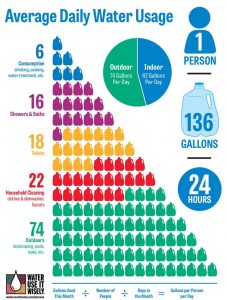It amazes me how much freshwater is embedded within almost every commodity we produce. The products in the below diagram from, What does virtual water conceal, are all mass produced throughout the world. They are common in most people’s daily lives. Our water foot print is tied directly to our state’s economic structure.

Our water footprint changes everyday not only individually but globally. As individuals we need it to survive, we are encouraged to drink it, it is in the food we eat, and it’s necessary to complete basic household tasks. I don’t know about you but, I take a shower every day, I brush my teeth and I do the dishes which tend to waste water. I know like most I try to drink 64 oz of water and eat three meals a day without thinking twice about the bigger picture, until last week. The material pushed me to look into how much water I actually use because as individuals we don’t necessarily bring too much attention to it. It raises the question, when will we run out of water, or can we?
I ended up finding a website that would help me calculate my own footprint. It turns out that just with basic household tasks throughout the week I use over 1900 gallons of water a week on average, not including my personal water consumption. This is typical for someone who does three loads laundry a week, runs the dishwasher at least once and shower daily. They say knowledge is power so I would encourage you to take the time to figure out what your footprint it. Maybe if more people knew how much water they used we could learn to use it more efficiently.

I liked the personal perspective in your article! I agree with your sense of astonishment in equating how we live to resource use – 1900 gallons?? And with more knowledge, I think we can all do a better job of economizing our resource consumption. At the same time I think that humans have always used natural resources to stay alive, as does every other living species on the planet. I am a firm believer in Michael Maniates’s assertion that the problems we face with resource scarcity are hardly going to be solved with dislocated individual actions. As he suggests, problems that stem from systemic causes require systemic solutions. Still I think I’ll make sure the dishwasher is full before I fire it up next. Thanks for the interesting perspective.
In response to your post, as well as Rick’s response, I think we can definitely make great impact on an individual scale to reduce consumption and water waste. Especially if we share information about conservation with our family and friends. Most people don’t really need to shower every day, or do three loads of laundry every week. Many people in the developing world don’t even have showers or washing machines and manage to get along. I think a pervasive issue with (especially American) people’s perspective today is that we don’t matter as individuals, and we always leave the solutions to the next person, or next generation. We are, also, so obsessed with convenience that a lot of our choices don’t come down to what we can or can not do, but what we feel or don’t feel like doing. All of this said, I took the quiz and I still use 1,385 gallons of water per day! I thought my water use would be much lower because I only shower twice a week, don’t run my dishwasher often, and don’t do laundry often at all. I feel like I use a lot of water but it mostly comes from eating meat and feeding my dog. I can’t really say that I know where I could cut down on water use…
One industry that surprised me as one of the leading pollutants and water consumers is the fashion industry. I guess tons of water goes into washing and soaking clothes. I never would have thought!
Great blog post and pretty amazing data! I recently read an article about how water may become the natural resource that is most fought after in the not-so-distant future, the way that we see international wars break out over things like oil and diamonds. What came to mind when I was reading about how much water used each day, I started thinking about how fresh water is used in massive quantities each day in factories all around the world for the manufacture of everything from paper to computer microchips. It is not surprising that there is a direct correlation between footprint and a state’s economic [and social & political] structure.